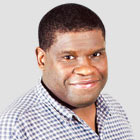
He has roused black and young voters as never before, but he has to maintain the rest of the Democratic base
by Gary Younge
 The Brazilian president, Luiz Inácio Lula da Silva, has a compelling personal and political biography. One of eight children, he could not read until he was 10, left school soon after and by the age of 12 was working as a shoeshine boy. Lula was instrumental in setting up his own leftwing political party, the Workers party, risked jail as a trade union organiser during the dictatorship and ran for president three times before he was finally successful in 2002, capturing the imagination and hopes of many Brazilians - albeit with a vastly watered-down programme.
The Brazilian president, Luiz Inácio Lula da Silva, has a compelling personal and political biography. One of eight children, he could not read until he was 10, left school soon after and by the age of 12 was working as a shoeshine boy. Lula was instrumental in setting up his own leftwing political party, the Workers party, risked jail as a trade union organiser during the dictatorship and ran for president three times before he was finally successful in 2002, capturing the imagination and hopes of many Brazilians - albeit with a vastly watered-down programme.
Having finally won the presidency, a moment many of his supporters thought would never happen, he was then cruelly mugged. The invisible hand of the market grabbed him on his way to the inauguration and shook what was left of the socialism out of him. In the three months between his winning the vote and being sworn in, the nation's currency plummeted by 30%, $6bn in hot money had left the country, and some agencies had given Brazil the highest debt-risk ratings in the world.
"We are in government but not in power," said Lula's close aide, Dominican friar Frei Betto. "Power today is global power, the power of the big companies, the power of financial capital."
In any democracy the link between the electoral and the political is essential but not inextricable. Between the trappings of democracy and the trials of legislating, there is power. The balance, distribution and strategic exercise of it shapes the relationship between expectations and possibility, marking the distinction between being the will of the people and the work of government.
It is the very tension that lies at the heart of Barack Obama's candidacy and the energy it has unleashed.
- more -








No comments:
Post a Comment